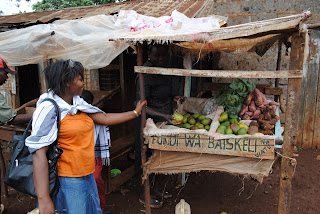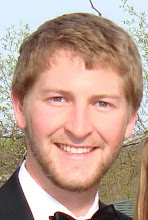Margaret and Joseph, the CFA workers in the Banana Hill center, learned a few months ago about an organization known as DOREP. DOREP is a non-profit, partially government-funded organization that originally sought to help empower people living in the arid Northeast province of Kenya - hence the name, which stands for "Desert Oasis Resident Empowerment Program." It is different from many "pure" microfinance organizations in that it is not a bank, it is not fully self-sustaining on income from loans, and it relies on government assistance for funding [caveat: because of this, and other technical mistakes I might make, some of my more economically-minded friends might need to offer some corrections on this post...I'm definitely not an economist].
A DOREP representative held a seminar for the 70-some clients at the center several months ago, explaining to them the program and inviting them to register in a group. To be eligible for the microfinance services, DOREP requires a group of at least 15 committed individuals to register together, and 35 of our clients decided to give it a try. With the help and advice of the center workers, each client filled out a registration form and brought a registration fee of about $2.00, which officially enrolled them in the program and formed the foundation for an individual savings account in each clients name. From that point, the entire group of 35 was required to meet with a DOREP representative, named Kimani, twice a month. At each one of these meetings, the group members bring a small amount of cash to add to their personal savings account.
 BUT, the DOREP representative doesn't take this money with him when he leaves. Instead, the total amount that is brought to the meeting is made available to group members in the form of "soft loans." For example, in the early meetings, the group might bring a total of about $100 to put in their individual savings accounts. That cash is divided into portions of about $5-10, and these portions are given to group members with a proposal for how they can use the money to boost their income during a one-month period - this could be by buying a sack of potatoes to sell at the market, which are cheaper in bulk, for example. The recipients of the soft loans are required to pay back the amount of the loan, plus 10%, one month after receiving it. The other members of the group help to hold the recipient responsible, because if the recipient doesn't repay the loan, there is less money available for other soft loans in the future. So far our group has had ZERO soft loan defaults, and in the last group meeting (about 3 months into the process), the group of 35 members brought a total of about $300 to save in their respective accounts, allowing 18 of the members to receive "soft loans" of up to $20.
BUT, the DOREP representative doesn't take this money with him when he leaves. Instead, the total amount that is brought to the meeting is made available to group members in the form of "soft loans." For example, in the early meetings, the group might bring a total of about $100 to put in their individual savings accounts. That cash is divided into portions of about $5-10, and these portions are given to group members with a proposal for how they can use the money to boost their income during a one-month period - this could be by buying a sack of potatoes to sell at the market, which are cheaper in bulk, for example. The recipients of the soft loans are required to pay back the amount of the loan, plus 10%, one month after receiving it. The other members of the group help to hold the recipient responsible, because if the recipient doesn't repay the loan, there is less money available for other soft loans in the future. So far our group has had ZERO soft loan defaults, and in the last group meeting (about 3 months into the process), the group of 35 members brought a total of about $300 to save in their respective accounts, allowing 18 of the members to receive "soft loans" of up to $20.The other benefit of saving with DOREP is eventual access to "hard loans" for greater amounts. Once a member has personally saved about $25, they are eligible to receive a loan for 3 times the amount they have saved. This loan is different from the "soft loans" because the money does not come out of the pooled savings of the group, and it is given for a longer term. The recipients of the hard loans have about a year to pay back the loan at a 1% interest rate. A unique opportunity offered by DOREP, though, is for members to take loans in non-cash forms. For example, a member who is eligible for a loan of $100 might choose to take a dairy goat instead of cash and repay the loans with profits from selling milk. If a member chooses to take this kind of agricultural project loan, DOREP trainers will teach them the best ways to manage their project (goats, chickens, rabbits, cows, greenhouses, fish-ponds, etc.) free of charge, and they will also provide a partial or full market for the products that result (milk, eggs, fish, vegetables).
 Some of the members in the CFA group at Banana have now saved enough for hard loans. Several of them are planning to take the loans in cash - they have a small business and need capital to help it grow, increase their inventories, or make investments to increase productivity. Others are planning to pursue project loans, primarily for rabbit- and poultry-keeping. It's extremely exciting to see the passion and commitment that our clients have demonstrated towards a program like this. They have been incredibly consistent and faithful in saving and repaying loans, and they all speak highly of the program - even to the point of sharing with clients from other centers about its benefits. As an added benefit for CARE for AIDS, the bi-monthly meetings provide a great chance for ongoing fellowship and community-building among people who have missed out on this type of encouragement for so long.
Some of the members in the CFA group at Banana have now saved enough for hard loans. Several of them are planning to take the loans in cash - they have a small business and need capital to help it grow, increase their inventories, or make investments to increase productivity. Others are planning to pursue project loans, primarily for rabbit- and poultry-keeping. It's extremely exciting to see the passion and commitment that our clients have demonstrated towards a program like this. They have been incredibly consistent and faithful in saving and repaying loans, and they all speak highly of the program - even to the point of sharing with clients from other centers about its benefits. As an added benefit for CARE for AIDS, the bi-monthly meetings provide a great chance for ongoing fellowship and community-building among people who have missed out on this type of encouragement for so long.So, despite all of the general confusion and conflicting opinions, I've been very impressed with microfinance and have enjoyed seeing the real impact that it is having on our clients. I don't know if it really is the tool for banishing poverty globally, but I can speak to it's success in my small, but very needy, corner of Kenya!







Nick,
ReplyDeleteIn formulating plans for our micro-savings initiative here at Manna Project, it's so important to hear about new and innovative microfinance projects. This is a model I have not seen before (or perhaps just not articulated as clearly).
Thanks!
Ian
i am so excited about this project, i think this will go a long in alleviating poverty and suffering among our people, certainly i would like to be associated with this, asante.
ReplyDeletehi just seen ur report an very exiting when are you coming to NGONG
ReplyDeleteMariakanis projects are taking off at very slow rate.We at coast are for the very much.Thanks for your valuable efforts. Thanks,and God Bless you.
ReplyDeleteIam really encouranged for the good work you are doing to empower the community as a whole and my most sincere thanks are the group of women who have come alll long way of building their future especially the widows ,sick women those are people who are vulnarable at all times.congraculation and would like to join you people am jepkemoi from Eldoret theirs alot to be done at the groung level as we focusses 2030 vision God bless the work of your good hands
ReplyDeleteIam really encouraged for the good work you've done especially Empowering women who are the stalk holders of our society.This are the people who are Vulnerable especially the widows,sick whom when encouraged will have hope for tomorrow.Personally i wish to be part of the team am Jepkemboi from Eldoret and would wish to join hands with this organization and build a capacity team especially at the ground level.God Bless the good work of your hands
ReplyDeleteIts wonderful somebody just told me about Dorep,and by googling i have seen what i have be en looking for am planning to come in person and learn more as i join you people. NDIRANGU
ReplyDelete